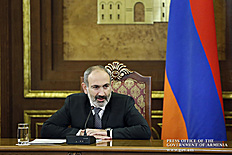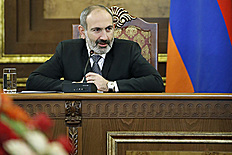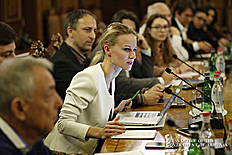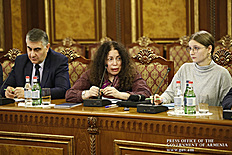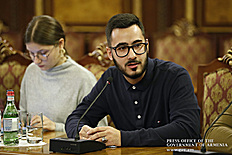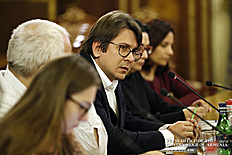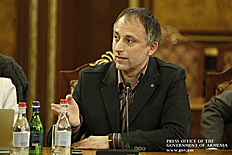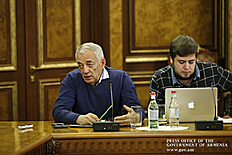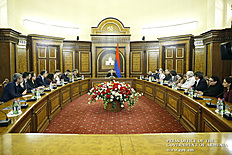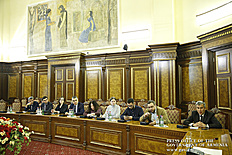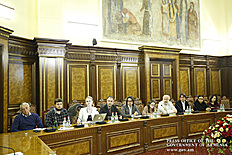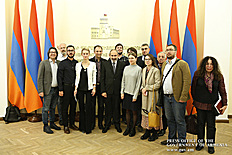more 9 photos
Stanislav Smagin, Novorossiya News Agency - First of all, we would like to thank you for the warm welcome which, as evidenced by Armenian tradition, exceeded all expectations, and we hope this is not the last time. I think a lot of positive things will be said about the warm moments we are having, so I would like to start with a question that is somewhat controversial and now divides us. To my mind, we have mostly come here to get clarifications on the question about Garegin Nzhdeh.
For most Russians he is not an indisputable figure, and for most Armenians he is a national hero. We have raised this question during several meetings held here, and the answers varied. Some claim that this issue has been resolved for them, that he is a national hero, and that there are no questions. They say if you wish so take care of your attitude. We were told that the question has been exasperated on the part of Azerbaijan, so there is no need to make elephants out of it. Others say that in principle this question should not be raised at all. But we understand that to make an elephant from a flea, first of all, we need a flea.
It is clear that each country has its own interpretation of history, and this is quite normal. But the relations between our two countries have so far been so warm, friendly and of strategic nature; we have so much in common that controversial divisive issues like this are supposed to be tackled through joint effort. That is, maybe there is a way to resolve this issue together.
For example, a joint commission of historians, public figures, and political scientists needs to be set up to analyze the matter in depth, comprehensively, and find a modus vivendi. In general, are there any options for resolving this problem other than not addressing it?
Prime Minister Nikol Pashinyan - Thank you very much for the question. To be honest, I have never encountered this problem in our relations with Russia, I have never dealt with this issue either during our contacts, or during our conversations and negotiations, I have never heard of it from our Russian partners.
Frankly speaking, I thought this issue was on the agenda of our relations with Azerbaijan, as I first unexpectedly encountered it during the CIS Summit in Ashgabat, and to be honest, it is somewhat surprising that this issue is associated with our relations with Russia.
At least, nobody talked about Garegin Nzhdeh during our conversation with our Russian colleagues. What about Garegin Nzhdeh’s personality? I talked a lot about it in Ashgabat. You say let us set up a commission.
You know, it would be strange for us to set up a commission with Russia to study our own history. Where does the name of Garegin Nzhdeh come from? His name came from the May heroic battles that led to the first-ever republic established in our people’s history - the First Republic of Armenia in 1918.
By the way, Hovhannes Baghramyan, too, participated in those battles. In fact, they fought side by side for their homeland and, as a result, Hovhannes Baghramyan became a Soviet Union Marshal, a double hero of the Soviet Union.
For the Armenians, Garegin Nzhdeh and Hovhannes Baghramyan have the same origin as historical figures. That is, they fought for Armenia, for the nation, and they tried and did everything to protect their people from the Turks who organized the Armenian Genocide. There is much talk now, for example, that Garegin Nzhdeh had some contacts with the Third Reich. Molotov also had contacts with the representatives of the Third Reich. Let us set up a joint commission and study what happened following the Molotov-Ribbentrop Pact.
Has anyone in Russia condemned these acts? Why not? If we want to start a debate, let us start with Molotov. What did he do? Why not? What have they agreed on? And what was Stalin doing? Did he have any idea about what they were negotiating there? We have no questions about Garegin Nzhdeh’s personality. He is the one who fought with Marshal Baghramyan for his homeland.
Diana Kovaleva, Rossiyskaya Gazeta – The next question to you: rumors go that the signing of a Russian-Armenian memorandum on Russian experts’ access to the US-funded Armenian laboratories has been postponed.
I would like to ask you what is hampering the signing of this document. Could you please tell us when it will be signed after all?
Prime Minister Nikol Pashinyan - First of all, these laboratories are not funded by the United States. They were created with US funding, but they are the property of the Republic of Armenia. That is, no one except those Armenian officials authorized to enter those institutions has free access to the aforementioned laboratories. It is the property of the Republic of Armenia like this building. No one can enter this building without the permission of the Armenian authorities. You have come here, too, and you had to go through some procedures.
It should be reiterated that the laboratories are the property of the Republic of Armenia. For example, we likewise have some facilities donated to the Republic of Armenia by the Russian Federation - technical equipment, etc and so on. There are also technologies and equipment donated to Armenia by China and many other countries, but all this is the property of the Republic of Armenia.
Here is a very important nuance. That is, the Americans do not have free access there, and at this point they are entitled to go there just as often and under the same procedure as is applicable to the Russians. At times, the Russian press gives the impression that the Americans can come whenever they want. That is not the case. Even those Armenians not employed in these laboratories have no right to be there because they deal with hazardous matters.
I was told that we had a draft agreement ready for signing, but for some reason our Russian partners decided not to do so. They suggested amending the text, and we agreed. We will work together on this document, and it will be signed when both sides are ready.
Diana Kovaleva, Rossiyskaya Gazeta – Did the Russian side say what exactly had to be amended?
Prime Minister Nikol Pashinyan - Maybe they did, but I cannot share such information with you.
Diana Kovaleva, Rossiyskaya Gazeta – My next question has to do with the same laboratories. How could you comment on the ideas that have appeared in the press about the fact that these laboratories can only be accessed by the Armenian citizens working there, but probably the former sponsors are the ones to order the ongoing activities?
Prime Minister Nikol Pashinyan - I already said that this is Armenia’s property. I have already said that Russia is our strategic ally. How can I comment on what you are saying?
Does that mean we are now acting against Russia? Do we want to harm Russia? Are we involved in a conspiracy against Russia? There can be no such thing. At least, this is our perception of a strategic ally.
I hope we all understand what does a strategic ally mean. This means that we cannot act against each other, we cannot act in a way that violates security interests. We will never act against Russia’s security interests. It is impossible; it just cannot happen. I am sure that either Russia will never act against Armenia’s security
Marina Perevozkina, Moskovsky Komsomolets - Mr. Prime Minister, the press often states that you are close enough to First President of Armenia Levon Ter-Petrosyan, that you seem to be genetically derived from him, while some columnists even have called you a new reincarnation of Ter-Petrosyan in Armenia’s politics.
Can you tell us about your real relationship with the First President? Do you entertain friendly relations? Do you keep in touch with each other? Has he played any role in your political career? What was his political influence? Thank you.
Prime Minister Nikol Pashinyan - Look closely at me and say if I am like someone else’s reincarnation. I am a public figure, and I have been in public life ever since the age of 16 when I first worked as a journalist. You could trace back everything I had done since 1991. In fact, you can also follow my daily activities. I mean it is impossible for me to have any shadowy connections that the public at large is not aware of.
Our political relations with Levon Ter-Petrosyan ended in 2012, and it was publicly recorded. It was quite a lengthy process. I wrote a number of articles in late 2011, and in 2012, we actually broke down all political contacts. After that I started my own political initiative. I have neither ideological, nor organizational and political connection with Ter-Petrosyan. No connection at all. I don’t even have one now.
After my being elected Prime Minister, Mr. Ter-Petrosyan wanted to meet with me. He said he had very important information. We met at the Government House and talked to each other. And this was our first meeting since 2012.
By the way, I started my political career in 2006, while Levon Ter-Petrosyan returned to politics in 2008. Yes, this is a well-known fact. In 2007, when he started steps to return to politics, he was a presidential candidate, I was a member of his election campaign just as most of the representatives of the Armenian opposition parties. Before and after that everything was public. That is to say, I have had no political affiliation with Mr. Ter-Petrosyan since 2012.
Marina Perevozkina, Moskovsky Komsomolets - And what information did he tell you when you met?
Prime Minister Nikol Pashinyan - He gave me some information on the Nagorno-Karabakh negotiation process, but I told him that I practically knew all the information that Mr. Ter-Petrosyan forwarded to me; he did not say anything new to me. In other words, I was a Prime Minister at that time, and it seemed logical for me to ask for whole information on the Nagorno- Karabakh negotiation process. As a matter of fact, I was already familiar with that information.
Abbas Juman, Special Correspondent for the Federal News Agency - My question is about the Syrian Armenians. I am half Syrian. We were just talking about Levon Ter-Petrosyan who was born in Syria, too, in Aleppo, if I am not mistaken. I mean that Syria and Armenia are close countries, and after the war, many, thousands of Syrians returned to their historic homeland.
I have not met any one of them as of yet due to my hectic timetable, and hopefully I will do so tomorrow. I would like to know from you what they are like now, whether they have settled in, are they planning to return home, I mean Syria or have they found permanent asylum here?
And the second part of the question seeks your attitude to what is happening in Syria today, I mean Turkey’s recent intervention, which I think should cause great anxiety in Armenian society, as it can serve a precedent, and there is no guarantee that tomorrow Turkey will not organize another massacre by the hands of Azerbaijan, for example in Artsakh, as it was the case in 2016.
Prime Minister Nikol Pashinyan - You know, the Armenians are at home in Armenia. You asked if they intend to go back home. Those who are in Syria are also at home, and I generally think that Armenia is home to all the Armenians in the world.
Many Syrian-Armenians have settled down well in Armenia, but unfortunately, not all. many of them emigrated to Canada, Europe, the United States, and possibly Russia; some returned to Syria.
As for the situation in Syria, Syria is a friendly, fraternal country for us, and we are indeed very much concerned about what has been going on in the country in recent years.
You may know that we have sent a humanitarian mission to Syria. They are involved in de-mining and medical operations over there.
While you were asking the question, I wanted to find specific statistics on how many surgeries our doctors had performed there and how many patients had come to see them. I found out that they had done hundreds of surgeries; they had received thousands of patients. We also have a pediatrician working there; many children are being providing medical care, and of course we wish all the best to Syria and the Syrian people.
We were indeed extremely concerned about the Turkish invasion. We made a statement and condemned the move. They invaded Syria with no invitation from the government of that country. This will not help find solutions to problems in Syria; instead it will aggravate the situation.
We were also worried because there were thousands of Armenians living in Jamishli, and when we were in Ashgabat, I talked to the Russian President about it, and I have also publicly thanked him for the written agreement reached between Russia and Turkey, in which our concerns about Jamishli have been taken into account, and this is how I imagine the strategic cooperation between Armenia and Russia. This is a concrete example, and I am convinced that our relations will develop in this spirit.
Question - Robert Kocharyan, Serzh Sargsyan are the former leaders of Nagorno-Karabakh. I have heard on several occasions that their fate may have an impact on Nagorno-Karabakh, on your relations with Nagorno-Karabakh.
Prime Minister Nikol Pashinyan – I wonder what impact you mean. How can this have an impact? For instance, the former Minister of Nature Protection is currently in hiding: Can this affect my attitude towards Armenia’s nature, or for example the former Minister of Finance is now in prison, can this affect my attitude to Armenia’s finances in any way?
The problem of Nagorno-Karabakh is the number one security challenge for Armenia, for the future of our country and people. You just evoked some resolutions, but to be honest, I prefer speaking with my own formulas concerning the Karabakh issue, rather than with those adopted by my predecessors. I have already spoken about this formula publicly, like the one I cited.
I have said that any solution to the Nagorno-Karabakh conflict should be acceptable to the peoples of Armenia, Nagorno Karabakh, and to the people of Azerbaijan.
By the way, I am the first Armenian leader to declare that the resolution of the Nagorno-Karabakh issue needs to be acceptable to the people of Azerbaijan as well. That is why I was heavily criticized in Armenia. My critics wondered why an Armenian leader should worry or think about the interests of the Azerbaijani people.
But I am convinced that if we speak of a settlement, and not of a victory or the defeat of one of the sides, if we want lasting peace and stability, we must find a solution acceptable to the peoples of Armenia, Nagorno-Karabakh and Azerbaijan. And I hope that the President of Azerbaijan will come up with a similar statement.
If I first of all mention the peoples of Armenia and Nagorno-Karabakh, and then the people of Azerbaijan, let him say the opposite. Let him say that any solution to the Nagorno-Karabakh conflict should be acceptable to the people of Azerbaijan, to the people of Nagorno Karabakh and to the people of Armenia. That will mean that we have a chance to make a real breakthrough in the negotiation process. This is my formula for resolving the Nagorno-Karabakh conflict, which means that I am not going to use either Serzh Sargsyan’s or Robert Kocharyan’s formulas. I will neither use Levon Ter-Petrosyan’s approach in the negotiations.
Question – Could you please decipher this formula for us? What do you mean by saying “solution acceptable to the Armenian people?”
Prime Minister Nikol Pashinyan - I am talking about the conceptual basis of the negotiation process. If I say that any solution must be acceptable to all three peoples, it would not be too constructive to state that we just want such a solution.
I propose to the Azerbaijani President and the Minsk Group Co-Chairs to conceptually agree that we should work to find a solution acceptable to the three peoples. Are there any such options? If there were such ready-made options, it would be a different situation, but I say so because we still have to work on it. It is an objective that can only be achieved through hard work, and I invite our partners, our friends to work to that effect. I mean not only the President of Azerbaijan, but also the President of Nagorno-Karabakh, as well as the OSCE Minsk Group Co-Chairs.
Alexey Stefanov, Russia Today Agency, Sputnik Agency - Yesterday we saw the biggest-ever failure of Armenia’s national football team. Have you watched the game? What to do, which way to go with it? The Armenian national team lost yesterday. In the meantime, you had stated in your plans that the national team should at some time qualify for the European and World Championships.
Prime Minister Nikol Pashinyan - Well, to be honest, I did not expect it. I had proposed a strategic development plan for Armenia by 2050, and there were some 18 goals set in the plan, one of which provided that the Armenian national football team should have won European or World Cup medals by 2050.
This is a very serious failure indeed, considering that this year we had the opportunity to do something about it, but unfortunately it did not work, and now we have to make some conclusions.
Alexey Stefanov - And who is to blame?
Prime Minister Nikol Pashinyan - Who is right, who is to blame is an eternal question.
Alexey Stefanov – Could you please tell us whether the gas price talks are still going on? You discussed this issue during a meeting with Putin. What is the Russian side’s position? Can Yerevan expect a carte blanche in the matter of gas?
Prime Minister Nikol Pashinyan - To be honest, we had a general conversation with Vladimir Vladimir. We did not specify or talk about the details. We agreed that the gas price for Armenia should be such as not to impair the country’s economic dynamics.
This year we expect to have a fairly good growth indicator, and we have agreed that the price of gas should be such as the dynamics could not deteriorate. Ever since, representatives of the Armenian government have been in close touch with their Russian counterparts.
I am pleased to note that the gas price will not rise for Armenia until at least next spring. That is good news. It may prove not that convenient for us in the long run, but not too bad. We are hopeful and confident that we will have a constructive dialogue, and I hope we will reach a common decision.
Alexander Trushin, Ogonyok Magazine - Mr. Prime Minister, I have two questions. Question One: You have initiated serious reforms in the economy and social life. Does the Armenian Diaspora support your reforms, do they participate in the implementation of your projects, even if only for the sake of financing some projects that may or should improve the lives of ordinary people in general?
And the second question: There is a big difference in the economic and social development of regions in Armenia. Do you have a plan for the proportionate development of individual regions? What can be done to solve this problem?
Prime Minister Nikol Pashinyan – A short while ago we made a decision to move the vehicles customs checkpoint from Yerevan to Gyumri. A center for foreign economic activities is being set up. Exporters and importers can benefit from a one-stop-shop facility so that people could feel at ease in exporting or importing goods from and to Armenia, and we know that Gyumri residents and small businesses already feel the positive impact of this decision. And this is one concrete example of proportionate regional development. Of course, this is a crucial issue for us, and we will continue with this logic.
Last year we allocated 10 billion drams (about USD 22-23 million) for joint projects to be implemented in the provinces, that is, with the local authorities, and in 2020 we will allocate as much money. Why so much? Because, unfortunately, our towns and villages still cannot afford to spend more money on development projects.
These are subsidy programs. They work as follows: 60% of the project is funded by the government, 40% by the local authorities, sometimes 70% and 30%. Local authorities should submit sound development projects.
I have already visited several regions to inspect the pace of said programs. Somewhere they are going quite well, elsewhere not so well. We are principled in quality-related matters: poor quality will not be accepted, and therefore we will not pay for works of dubious quality. This is a very important issue, and we are working in this direction. There are also a number of state-funded programs for the provinces. For example, we have a program called “smart farm.” What do we offer? For example, if people are building a modern farm in a border village under a specific project, the government pays 70 percent of the cost in cash. Such farmers need to attend special trainings where they are told how to make a real profit on their farm. After that, they come together, set up the farm, the State Commission accepts it, confirms that everything complies with the proposed standards, and the state pays 70 percent of their expenses in cash. In other regions, it may come to 50 percent, elsewhere - 30 percent.
We have several such projects. We have a standalone program for greenhouses; there are projects intended for intensive orchards and so on. That is, we have a number of programs to provide for harmonious development of our regions.
As for the Diaspora, note that our government enjoys a very high level of trust among Armenians around the world - in the United States, Europe and Russia.
This, of course, expands our reach, and many of our compatriots from the Diaspora come and help us. Some of them are currently working in the government. We now have a deputy minister of economy who came from Russia, while the former mayor of Glendale is the Chief Commissioner for Diaspora Affairs. That is to say, many people are returning to Armenia from the Diaspora. By the way, many are moving to Armenia from the Middle East, Russia, Europe and America.
And that is why real estate prices have gone up. This is just another problem. Many residents of Armenia who plan to buy real estate complain about the prices. Here, too, we are implementing mortgage programs to make mortgage loans more accessible to the population.
Question – Do you have any laws, government tools in place to support international investors?
Prime Minister Nikol Pashinyan - The nationality of investors has nothing to do here, because we support all investors. We have a very good law called startups’ law. We have some pretty good benefits for startups, and if I am not mistaken, they will be effective by 2023.
And in general, we are introducing a flat income tax rate of 23 percent starting next January 1, which will be down to 20 percent over time. It will happen by 2023. Of course, we also have an investment protection law, and we do our best to improve Armenia’s investment climate.
Yana Surinskaya, Interfax Agency - Is Armenia going to get a new lot of Iskanders? Are there any problems faced in the military-technical cooperation between Armenia and Russia?
Prime Minister Nikol Pashinyan - We have no problems in our military-technical cooperation with Russia. I cannot say any more.
Kirill Kharatyan, Vedomosti - You declared war on corruption. It is a painful subject in Russia. Tell us please whether things are as clear and accurate here as with your formula regarding the peaceful settlement of the Karabakh issue. In a word, how well is it going?
Prime Minister Nikol Pashinyan - The process is going well. The point is in the way we interpret it. As a matter of fact, we have succeeded in eliminating systemic corruption.
Of course, there are still corrupt officials that we are arresting and will continue to arrest. There are several criminal proceedings. It should be noted here that when we speak about the fight against corruption, we should mean not only the past, but also the present. Several criminal cases have been launched against officials over the past one year and a half. Some of them have been arrested. It is a matter of principle for us.
Rest assured that there will be no compromise in this matter. Corruption in Armenia has no future. There is another issue, namely that of getting back what has been embezzled. We are moving forward in this direction as well. We have drafted a new law on confiscation of ill-earned property without the court’s ruling. The bill allows confiscating property without a verdict if the official cannot prove the legality of his assets. After that the return process will be accelerated.
Andrey Berecz, TASS Agency – The Russia-Africa Summit was held not so long ago. The EAEU and the African Union signed a partnership agreement. As an EAEU- member country, is Armenia interested in working with African countries?
Prime Minister Nikol Pashinyan - Armenia is not only a member, but also a country chairing the EAEU. And look at what happened in the EAEU during our presidency. On October 1, Yerevan hosted a meeting of the Supreme Economic Cooperation Council, which was unprecedented in its scale: the Prime Minister of Singapore and the Iranian President were in attendance, and a free trade arrangement was signed with Singapore.
The Free Trade Agreement with Iran shall be effective by the end of our presidency. Of course, we welcome the agreement signed between the EAEU and the African Union. We are interested not only as a separate nation, but also as an EAEU-member state and a chair country. It is an event that took place during Armenia’s presidency.
